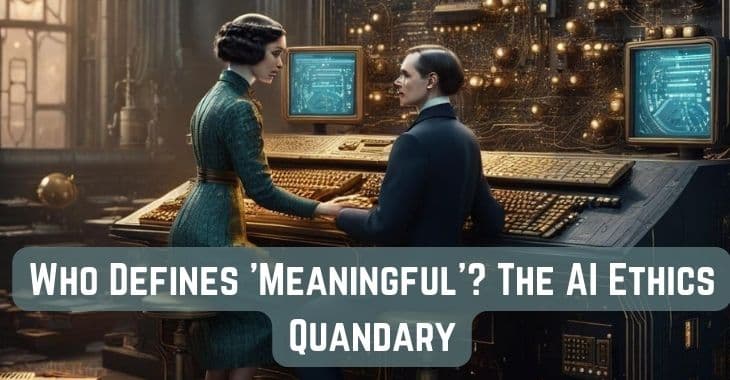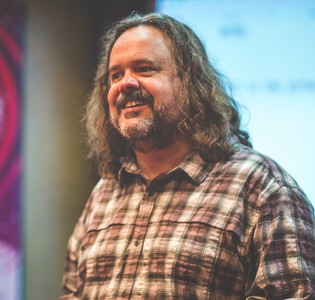Who Defines 'Meaningful'? The AI Ethics Quandary

Is 'meaningful participation' in AI development a genuine call to action or just another industry catchphrase designed to pacify critics? As AI continues to weave itself into the fabric of our daily lives, the clamor for ethical and inclusive practices has reached a fever pitch. But when everyone from tech giants to grassroots activists is throwing around terms like 'meaningful participation,' it's time to stop and ask: Who gets to define what's 'meaningful,' and who's just paying lip service to the idea?
A recent panel discussion at Science Gallery London, part of London Data Week, offered a deep dive into this topic. Curated by Irini Papadimitriou, Creative Director at FutureEverything, the panel featured Margaret Mitchell, Chief Ethics Scientist at Hugging Face; Lara Groves, Researcher at the Ada Lovelace Institute; and Caroline Sinders, an artist and machine learning design researcher. The discussion covered a wide range of issues, from the merits of open source AI to the role of public participation and the arts in shaping the technology's future.
So, what does 'meaningful participation' really mean, and how can it be more than just a catchphrase? Let's explore this further in the next section.
Defining 'Meaningful': The Realities and Illusions of Participation
"Meaningful participation is almost like a contested concept. What is meaningful to whom, and who gets to decide?" said Groves. This question is at the core of the debate. While tech companies often tout their commitment to public participation, the reality can be far more complex. Mitchell emphasized the need for participatory design involving different communities from the start of a project. "If you're using people's labor and you're making profits, you should be compensating them for their labor," she argued.
The concept extends beyond mere tokenism or surface-level engagement. It calls for a deep, detailed approach that respects diverse perspectives and values. It's not just about having a seat at the table; it's about having a voice in the conversation and the power to influence outcomes.
Surface-Level Engagement: Undermining 'Meaningful' Involvement
While the call for public participation in AI is growing louder, there's a lurking danger that this engagement may only be skin-deep. The panelists warned against the risk of co-optation, where public participation is reduced to a checkbox exercise. "There's a risk of co-optation where shallower approaches aren't compensated, and there's less respect for deep knowledge and lived experience," Groves noted. This is particularly concerning in a field like AI, where the stakes are high and the impact is far-reaching. Tokenistic engagement can lead to ethical blind spots, reinforcing existing power imbalances and perpetuating inequalities. Therefore, it's not enough to simply involve the public; the engagement must be deep, meaningful, and respected to truly impact the development and deployment of AI technologies.
Global Voices in AI: Whose 'Meaningful' Counts?
The perception and acceptance of AI vary significantly across different regions, and this was highlighted when an audience member cited a 2022 Ipsos survey. According to the survey, emerging economies had a more favorable view of AI, with approval scores in the high 60s and 70s, compared to just 30s in countries like the UK, Canada, and the US. Mitchell suggested that proximity to technology development might lead to greater awareness of its pitfalls. "When you're part of the system and building these things, you realize just how bad things can go," she said. This raises questions about the universality of "meaningful participation." What is considered meaningful in one context may not hold the same weight in another, underscoring the need for a more global, culturally sensitive approach to public engagement in AI. This global viewpoint enriches the conversation around AI ethics, reminding us that ethical considerations must be as diverse as the communities they aim to serve.
Artistry and Ethics: Who Decides What's 'Meaningful' in AI?
Artists serve as invaluable catalysts, offering a humanizing lens through which we can examine the ethical and societal implications of AI. Irini Papadimitriou and Caroline Sinders brought a unique perspective to the table, emphasizing the role of art in shaping the discourse around AI. "Artists are super valuable in understanding how different sectors and worlds can come together. It's about different perspectives," said Papadimitriou. Sinders added that art serves as a "necessary Trojan Horse to discuss useful, necessary change." This Trojan Horse opens up spaces for public dialogue and critical thinking, democratizing the conversation around AI. Artists also foster interdisciplinary partnerships, collaborating with technologists and policymakers to create AI solutions that are both technically robust and ethically sound. In a field often dominated by technologists and policymakers, artists offer a fresh lens through which to examine the complexities of public participation.
Artistic Activism: Challenging the 'Meaningful' Norms in AI
The intersection of art and activism in the AI space is emerging as a potent force for ethical change. Artists are not just creators but activists, leveraging their work to spark conversations and challenge the status quo in AI development. "Artists create conversations and spaces where we can start thinking about these ideas," Papadimitriou noted. This isn't just about aesthetics; it's about activism. Artistic interventions can serve as powerful tools for public engagement, challenging us to question our assumptions and consider alternative narratives. They can catalyze conversations that might be difficult to initiate in more conventional settings, offering a more inclusive platform for meaningful participation. Artistic activism serves as a reminder that AI is not just a technological endeavor but a societal one, requiring a multi-pronged approach that includes ethical considerations at its core.
Redefining 'Meaningful'—The Path Forward in AI Ethics
As AI continues to shape every aspect of our lives, the need for meaningful public participation has never been more critical. But as the panelists at London Data Week made clear, this is a complex, multi-faceted issue that requires a concerted effort from all stakeholders. Whether it's through the lens of art, the rigor of academia, or the activism of civil society, meaningful participation is not just a buzzword; it's an imperative for ethical AI development. As AI continues to evolve, embracing this multi-dimensional concept could be the key to managing the ethical complexities that come with technological advancement. And it's high time we moved beyond the rhetoric to make it a reality.
Have questions or comments about this article? Reach out to us here.






